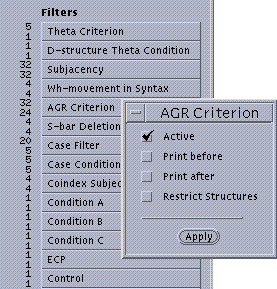
VSO (poor vs. rich AGR)
[45a] daxal-at n-nisaaQ-u makaatib-a(-hunna)
entered-f the-women-nom office.pl-acc(-their.f)
The women have entered (their) offices
[45b] *daxal-na n-nisaaQ-u makaatib-a(-hunna)
entered-f.pl the-women-nom office.pl-acc(-their.f)
SVO (rich vs. poor AGR)
[46a] n-nisaaQ-u daxal-na makaatib-a(-hunna)
the-women-nom entered-f.pl office.pl-acc(-their.f)
The women have entered (their) offices
[46b] *n-nisaaQ-u daxal-at makaatib-a(-hunna)
the-women-nom entered-f office.pl-acc(-their.f)
AGR Criterion:

Definition in file principles14.pl:
agrCriterion in_all_configurations CF where specIP(CF,Spec) then richAGRiffRNP(Spec,CF).
specIP/2 defined elsewhere as:
specIP(IP,Subject) :- cat(IP,i2), Subject immediate specifier_of IP.See online documentation (
http://www.neci.nj.nec.com/homepages/sandiway/pappi/doc/refman/)
for definitions of PAPPI primitives:
| Primitive | Description |
|---|---|
cat(X,C)
|
C category label of phrase X |
X specifer_of YP
|
[YP X [Y' Y .. ]] |
Two ways to define iff condition:
richAGRiffRNP(Spec,IP) :- IP has_feature agr(AGR), (1) richAGR(AGR) iff rNP(Spec) (2) poorAGR(AGR) iff expletive(Spec).[Actually neither is entirely correct, need to mix them for dependency reasons.]
richAGR(AGR) iff rNP(Spec)Define
richAGR/1 and rNP/1 (referential NP)
as follows:
richAGR(X) :- \+ unspecifiedForNumber(X). % also called by sCase rNP(X) :- \+ ( X has_feature nonarg(+) ; possibleEmptyExpletive(X)).
poorAGR(X) :- unspecifiedForNumber(X).Use
poorAGR approach because of interactions with theta
and binding theory.
Insertion of empty categories in PAPPI:
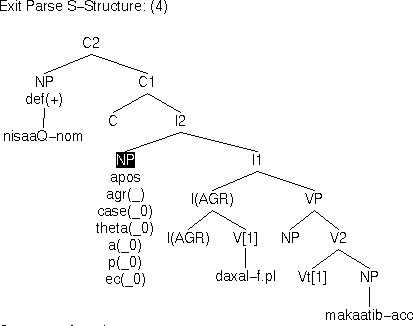
Typology: PRO, pro, trace, parasitic gap, operator, ...
New: Empty expletive (EXPL)
expletive(X) :- X has_feature nonarg(+). expletive(X) :- possibleEmptyExpletive(X), setExpletiveFeatures(X).Expletives in PAPPI have feature
nonarg(+).
possibleEmptyExpletive(X) :- ec(X), emptyType(X). emptyType(X) :- X has_feature ec(T), unassigned(T).Marks empty NP as EXPL:
setExpletiveFeatures(X) :- addFeature(nonarg(+),X), X has_feature_set [a(na),p(na)].Values for +/-A, +/-P:
na (not applicable).
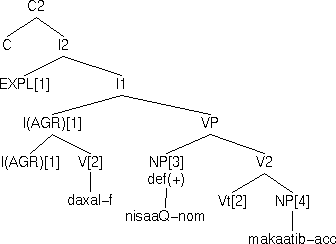
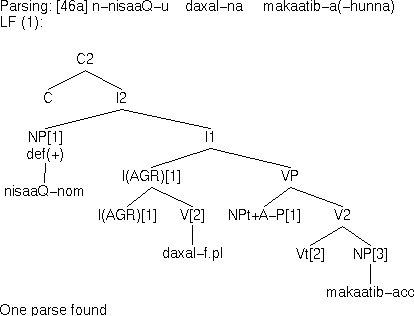
Rules out:
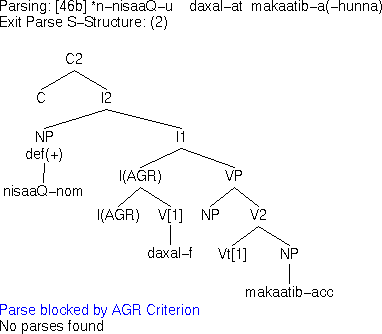
Assume NP[1] is an argument.
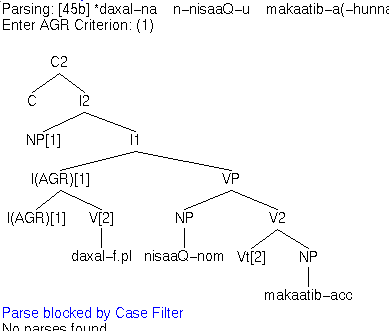
Switch off Case Filter, Theta Criterion violation:
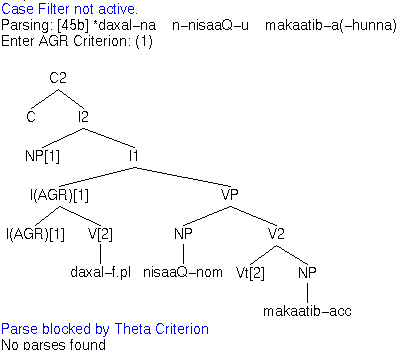
sCaseAssign in_all_configurations CF where sCaseConfig(CF,Assigner,Case,NP) then assignSCase(Assigner,Case,NP).
| Logical Variable | Description |
|---|---|
Head
|
the Case assigner |
Case
|
the Case to be assigned |
NP
|
the Case receiver |
Simplified definition:
sCaseConfig(CF,Head,Case,XP) :- governs(Head,XP,CF), caseAssigner(Head,Case), adjacent(Head,XP,CF) if caseAdjacency.Infl with poor AGR governs into Spec-VP:
governs(I,Subj,Proj) :- % governing into Spec-VP I head_of Proj, I has_feature agr(AGR), poorAGR(AGR), XP complement_of Proj, Subj specifier_of XP.
Proj = [ I(AGR) XP ] [XP Subj .. ]
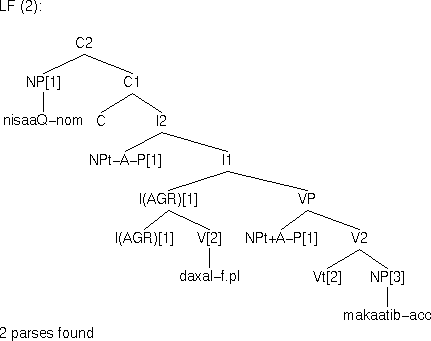
Subject moves to Spec-CP via Spec-IP.
PAPPI allows A-to-A-bar Case transmission, used in Topicalization and Scrambling.
However, this is insertion of Case at an intermediate trace:
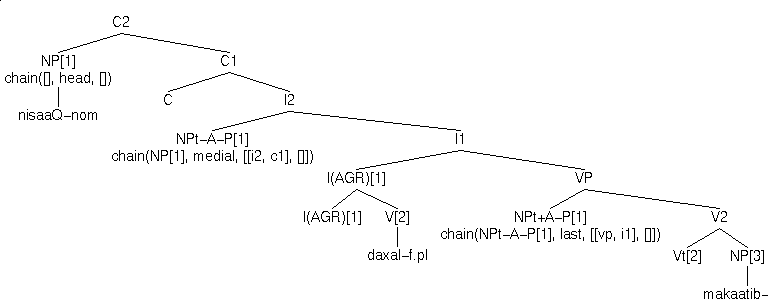
Eliminate this in the Case-marking code:
caseMark(Head,NP,Case) :- ec(NP), NP has_feature apos, antecedent(NP,A), \+ A has_feature apos -> \+ intermediateTrace(NP), % NEW aBarCaseTransmit(Head,A,Case) ; checkMorphCase(NP,Case), NP has_feature case(Case).
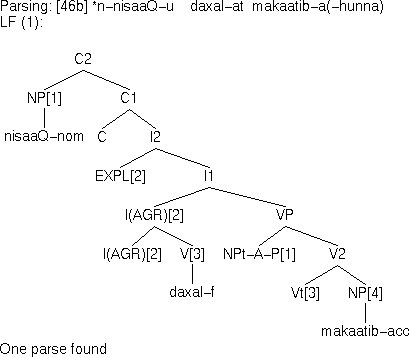
How to deal with this?